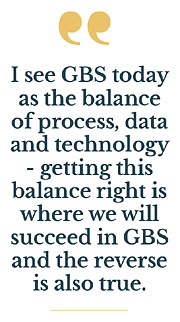In your presentation at the Festival of Future, you’ve mentioned that insourcing will become more popular as organizations seek more control and agility. Could you elaborate on the main drivers behind this shift back to in-house operations?
I see a few factors here that mean that I expect to see more in-sourcing in the coming years:
- Many outsourcing deals were signed 5-8 years ago and are thus up for renewal in the coming months/years - this means that clients will be asking themselves “should we keep these functions in BPO?”
- Clients want more control and agility in the processes, so in-sourcing would help in this regard
- Processes outsourced five years ago, particularly basic ones, may now be prime candidates for AI. In this case, businesses might find it more efficient to bring these processes in-house, as they become simpler and easier to automate.
What steps can GBS centers take to shift their focus towards customer satisfaction while maintaining operational efficiency?
I see this question from a different perspective—focusing on great customer service actually leads to better efficiency. When customer satisfaction is high, there are fewer queries, less pushback, and fewer issues to resolve. This frees up more time for processing and operations, ultimately enhancing overall efficiency. Customer service drives efficiency, not the other way around.

How do you see the balance between remote work and in-office work evolving in the GBS/SSC industry?
I would like (and most leaders in GBS would agree) to see more staff in the office—both in terms of people and days. Why? Team building is crucial to success, and this requires teams to see each other in person, have live conversations, and enjoy time together. I’m also concerned about the younger generation, as daily interaction is vital for their mental health and supporting those in need. Ideally, I’d like to see all staff in the office for 2-3 full days per week.
What do you see as the main limitations of AI and RPA today, and how can organizations manage expectations?
I am worried about this - AI and the digital revolution are coming, there is no doubt about that. But - we’re not looking at 50% of the GBS workforce being replaced in the next 2-3 years; it’s more likely to be around 20-25% over the next 3-4 years. My main concern is that leadership expects the digital transformation to happen ASAP, with everything fully implemented by 2025, but this simply isn’t realistic. The biggest challenge is that AI, RPA, and similar technologies depend on standardized processes and structured data—something most companies still lack.
In your opinion, should every employee in GBS be trained to at least a basic level in AI, RPA, and data analytics, or should companies focus on specialized teams?
Yes! In fact I see that as key to the long term success of GBS. If you do not do this then you will be left behind.
What do you think are the most pressing security concerns when it comes to AI, and how can GBS centers address them?
There are no real defined control standards for AI. Who is expected to check the code? Who is to audit the code? Do we implement AI and then later work out how to implement controls around and within AI? Very few are looking at this and that is a concern.
You’ve expressed some skepticism about the role of ESG in GBS centers. What do you think is the most realistic way GBS centers can contribute to ESG goals without it becoming a major operational burden?
My point is that while ESG can be fully managed within GBS centers, I’m not convinced there’s enough substantial “work” to justify a major focus. If ESG initiatives require 50 people, that’s significant but if it only currently involves 3-5 people then why should we get excited about this as a big deal?
What advice would you give to leaders entering the shared service space today, especially considering the rapid changes brought on by technology and shifting work models?
I see GBS today as the balance of process, data and technology - getting this balance right is where we will succeed in GBS and the reverse is also true - too much focus on technology alone will not drive success without equal attention to process and data.
Romek Lubaczewski, ex-Partner (retired), PwC Poland
Romek Lubaczewski was the Shared Service Centre and Outsourcing Consulting Lead for PwC Central and Eastern Europe, with nearly 30 years of experience in the field. He has led over 200 projects and opened more than 50 Service Centres worldwide. As a core member of PwC’s Global SS&O team, he also established five internal centres for PwC. Before his consulting career, Romek served as a Finance Director, COO, and BPO Hub General Manager. In 2023, he retired from consulting to become a “relaxed professional”.



Follow us